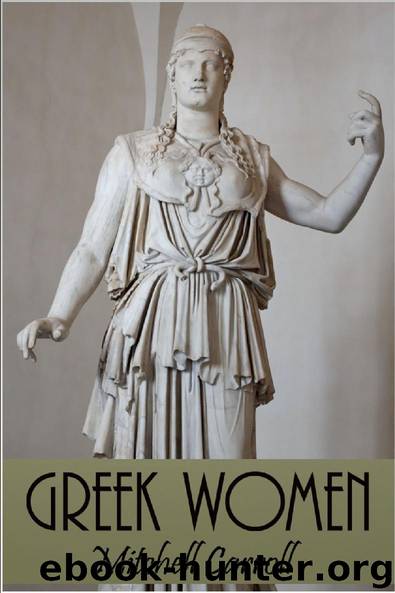Greek Women by Mitchell Carroll

Author:Mitchell Carroll
Language: eng
Format: epub
Tags: history, ancient, greece, greek, greeks, mythology, iliad, odyssey, spartans, sparta, women
ISBN: 9781781663981
Publisher: Andrews UK Limited 2012
Published: 2012-06-14T00:00:00+00:00
X
APHRODITE PANDEMUS
For the proper understanding of the status of woman among the Greeks of ancient times, it becomes necessary for the historian of Greek womanhood to call attention to a conspicuous social phenomenon pervading the life of all the nations of antiquity, but nowhere else so marked a feature of the higher life as in the lands of Hellas--a phenomenon bringing about social conditions that divided the female population of Greece into two sharply distinguished classes: the citizen-woman and the courtesan or mistress.
This notable aspect of Greek life is due to the fact that the ancient Hellene, as a rule, sought recreation and pleasure, not at the domestic hearth, but in the society of clever women, who had not only cultivated their physical charms, but had also trained their intellects and sensibilities so as to become virtuosi in all the arts of pleasure. Their pleasing forms of intercourse, their light and vivacious conversation, lent to association with them a peculiar seductiveness and fascination.
To designate this class of women in a manner which would distinguish them from the citizen-women on the one hand and the debased prostitute on the other, they were euphemistically called "hetæræ," or companions. The term hetæræ had been originally a most honorable one, and Sappho had used it, in the highest and best sense, of her girl friends as implying companions of like rank and interests. It is not known when it was first used with sinister suggestion, but, like our word mistress, it fell from its honorable estate and became the usual term to describe these women of pleasure.
The causes of the extent of hetairism among the Greeks are to be found in their religious conceptions, their political institutions, and the innate sensualism of the Greek peoples.
The Greeks were worshippers of the productive forces of nature as manifested in animal and plant life. Aphrodite is the female and Dionysius the male personification of the generative principles, and in consequence the religious ceremonials of these two deities assumed at times a most licentious aspect. In course of time, a distinction arose in the conception of Aphrodite, expressed by the surname applied to her. Thus Aphrodite Urania came to be generally regarded as the goddess of the highest love, especially of wedded love and fruitfulness, in contrast to Aphrodite Pandemus, the goddess of sensual lust and the patron deity of courtesans.
We could hardly expect high moral ideas in regard to sexual relations among the Greeks, whose deities were so lax. Zeus himself was given to illicit intercourse with mortal maidens and was continually arousing the jealousy of his prudent wife, the Lady Hera. Aphrodite was not faithful to her liege lord, Hephæstus, but was given to escapades with the warlike Ares. Apollo had his mortal loves, and Hades abducted the beautiful Proserpina. A people who from their childhood were taught such stories could hardly be expected to be more moral than their deities.
As has been shown in a previous chapter, the Greek conception of the city-state lay at
Download
This site does not store any files on its server. We only index and link to content provided by other sites. Please contact the content providers to delete copyright contents if any and email us, we'll remove relevant links or contents immediately.
| Africa | Americas |
| Arctic & Antarctica | Asia |
| Australia & Oceania | Europe |
| Middle East | Russia |
| United States | World |
| Ancient Civilizations | Military |
| Historical Study & Educational Resources |
Room 212 by Kate Stewart(5119)
The Crown by Robert Lacey(4814)
Endurance: Shackleton's Incredible Voyage by Alfred Lansing(4780)
The Iron Duke by The Iron Duke(4354)
The Rape of Nanking by Iris Chang(4211)
Joan of Arc by Mary Gordon(4109)
Killing England by Bill O'Reilly(4001)
Say Nothing by Patrick Radden Keefe(3984)
I'll Give You the Sun by Jandy Nelson(3447)
Shadow of Night by Deborah Harkness(3367)
Hitler's Monsters by Eric Kurlander(3341)
Mary, Queen of Scots, and the Murder of Lord Darnley by Alison Weir(3210)
Blood and Sand by Alex Von Tunzelmann(3203)
Eleanor & Park by Rainbow Rowell(3172)
Darkest Hour by Anthony McCarten(3129)
Margaret Thatcher: The Autobiography by Thatcher Margaret(3082)
Book of Life by Deborah Harkness(2938)
Red Famine: Stalin's War on Ukraine by Anne Applebaum(2932)
The One Memory of Flora Banks by Emily Barr(2863)
